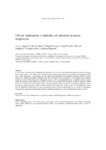Clinical implications of epithelial cell plasticity in cancer progression

Ver/Abrir
Use este enlace para citar
http://hdl.handle.net/2183/21580
Excepto si se señala otra cosa, la licencia del ítem se describe como Atribución-NoComercial-SinDerivadas 3.0 España
Colecciones
- Investigación (FCS) [1293]
Metadatos
Mostrar el registro completo del ítemTítulo
Clinical implications of epithelial cell plasticity in cancer progressionAutor(es)
Fecha
2015Cita bibliográfica
A. Aparicio L, Blanco M, Castosa R, et al. Clinical implications of epithelial cell plasticity in cancer progression. Cancer Lett. 2015; 366(1): 1-10
Resumen
[Abstract] In the last few years, the role of epithelial cell plasticity in cancer biology research has gained increasing attention. This concept refers to the ability of the epithelial cells to dynamically switch between different phenotypic cellular states. This programme is particularly relevant during the epithelial-to-mesenchymal transition (EMT) in cancer progression. During colonization, epithelial cells first activate the EMT programme to disseminate from a primary tumour to reach a distant tissue site. During this process, cells are transported into the circulation and are able to escape the immune system of the host. Then, a reverse process called mesenchymal-to-epithelial transition (MET) occurs on cells that settle in the distant organs. Although epithelial cell plasticity has an important impact on tumour biology, the clinical relevance of this concept remains to be recapitulated. In this review, we will update the current state of epithelial cell plasticity in cancer progression and its clinical implications for the design of therapeutic strategies, the acquisition of multidrug resistance, and future perspectives for the management of cancer patients.
Palabras clave
Cancer stem cells
Circulating tumor cells
Drug resistance
Epithelial plasticity
Medical perspective
Circulating tumor cells
Drug resistance
Epithelial plasticity
Medical perspective
Descripción
Mini-review
Versión del editor
Derechos
Atribución-NoComercial-SinDerivadas 3.0 España
ISSN
0304-3835






